The Day The Earth Caught Fire (1961)
Directed by: Val Guest
Written by: Val Guest, Wolf Mankowitz
Starring: Arthur Christiansen, Edward Judd, Janet Munro, Leo McKern
UK
AVAILABLE ON BLU-RAY, DVD AND DOWNLOAD
RUNNING TIME: 104 mins
REVIEWED BY: Dr Lenera
SPOILERS!
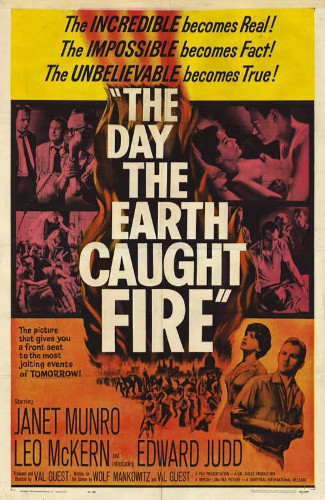
Daily Express journalist Peter Stenning has turned to the bottle as a result of a painful divorce and his work has suffered as a result, with his only friend veteran reporter Bill Maguire sometimes writing his copy, while his editor Jeff Jefferson gives him lousy assignments. Strange meteorological events begin to affect the globe after the Soviet Union and the United States accidentally detonate simultaneous nuclear bomb tests, and Britain starts to have a freak heatwave. When sunspots are suspected of affecting navigation and even people’s TVs, Peter is sent to the British Met Office to obtain temperature data where he meets switchboard operator Jeannie Craig, and finds out some things that he’s not meant to know.….
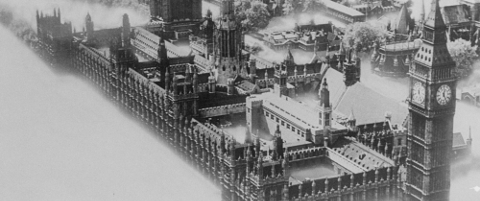
I’m sure I’m not the only one morbidly watching a lot of ‘end of the world’ movies these days, though the only one I’ve reviewed so far is the American/Japanese production Virus from 1980. This one is actually a film I’ve been meaning to see ever since my go-through on this website of all the movies made by Hammer studios several years back. Val Guest was responsible for quite a few impressive early Hammers, most notably The Quatermass Xperiment, Quatermass 2, Yesterday’s Enemy, The Abominable Snowman and Hell Is A City, so the fact that he also made a movie about the possible end of the planet really piqued my interest. And a typically impressive piece it unsurprisingly turned out to be, quite frightening in the way that it predicted global warming and causes us to wonder if all the extreme weather we get these days is not just climate change partly caused by our behaviour but a sign of something else. Guest’s liking for giving his work a realistic, almost documentary feel [there’s not even a music score] makes it one of the most believable films of its type, so much so that we just about accept some of the expected dodgy science in terms of what set the earth on its potential path to destruction and what may save it. It’s generally as sober as you’d expect a British handling of the subject to be, showing restraint and not even going much for big emotion, while its central romance is dealt with in a very adult and almost cold manner. But we do soon begin to care, and the tension is expertly maintained as we frequently cut away from the main newspaper office setting to a mixture of real and staged disaster footage which actually works rather well; only a few of the stock shots have those tell-tale scratches and softer picture density. There’s also a very cynical view of our governments as being dangerous idiots who try to conceal and lie about what they’ve done.
Guest first wrote the story in 1954, but no studio would finance a film explicitly about the effects of nuclear testing. Then in 1959 On The Beach, a prestigious production about the ending of the world due to a nuclear war, came out, so he and Wolf Mankowitz co-wrote a full screenplay, though Guest only managed to persuade British Lion to finance The Day the Earth Caught Fire by putting up his profits from his previous hit Expresso Bongo as collateral. Lead character Peter Stenning was originally written with Richard Burton in mind who would have been a perfect fit, but he was too expensive. Peter Finch was also contemplated but was unavailable. Due to the lowish budget, a great deal of stock footage was used, including even two shots from The Quatermass Experiment. The real interiors of the Daily Express office in Fleet Street were used for many scenes, while the Met Office was the outside and inside of the Ministry of Defense main building in Whitehall, a real rarity. For shooting in London’s streets, the police only allowed the crew to film for two minutes at a time. During filming at Battersea Park, the fog machines being used disturbed the Chelsea Flower Show on the other side of the Thames where the Queen was in attendance; Guest just about managed to shoot everything he needed while others kept the police at bay. The film was a hit and generally got much better reviews than science fiction back then tended to do. However, a company called Ronero threatened to sue the producers for the potential damage to the reputation of their products because of a scene where Jeannie is struggling with a Roneo stencil duplicator, saying it is “over-inking”; the offending line was cut. In the early 1990s, Guest was attached to a possible remake, to be set in New York City, though the plans ultimately fell through.
A fantastic yellow-tinted opening [the colour returns towards the end] gives us a few shots of deserted London including a really haunting one of the Thames totally dried up, before we see our flawed hero Peter stumbling down an empty street. 28 Days Later made a whole sequence out of this idea and turned it into something hugely eerie and haunting; here we only spend a few seconds on this as Peter goes into the Daily Express offices and goes to sit at his desk, only his typewriter doesn’t work so he has to dictate to one of the other few people still there. “It is exactly thirty minutes since the corrective bombs were detonated. Within the next few hours the world will know if this is the end, or the beginning. The rebirth of man, or his final obituary”. What a wonderfully dramatic lead-in this is to the flashback that will comprise the majority of the rest of the film, though one can only wonder at the possibility that it would have been even better with the great voice of Burton. We’re now thrust into the world of Fleet Street, a world that’s quite different from the way reporting is now, a world where, despite there being radio and TV, print was key. I find fascinating these portrayals of the way things once were in the bringing of news to the public, and Guest obviously found it just as fascinating at the time as he details the workings of a major newspaper in great detail, even taking us down to and around the plants when tomorrow’s headline has to be changed at the last minute. There’s much fast-paced banter, much like you often got in American films several decades before set in a similar environment; in the 1930’s one of Warner Bros’s most familiar tropes was a reporter hero always ready with snappy repartee. The only aspect that sticks out a little is Arthur Christiansen as editor Jeff; he was a recently retired editor in real life, but they had to cut around him because he had trouble memorising his lines and he looks awkward on screen.
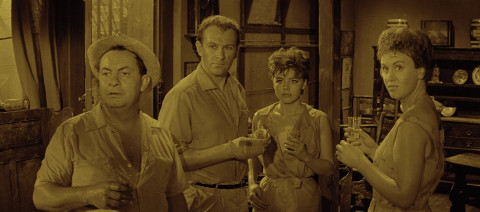
Peter is washed up, though still takes great delight in seeing his son, taking him on ghost train rides to the annoyance of his ex-wife’s second husband’s maid, though there’s jealousy in addition to resentment when he criticises the privileged way in which he’s now being brought up. He first encounters Jeannie over the phone where he gets annoyed at her refusal to put him through to the right people. “That girl’s a bigger threat than radiation” he says to his long-suffering friend Bill, which she hears. Upon meeting her in the flesh, she slaps him, yet he still makes it pretty obvious that he wants to get laid, and his overtones may seem uncomfortably forceful to some modern viewers. But their banter is fun and Judd and Munro have an easy-going kind of chemistry. You can even catch a very brief glimpse of a nipple when she’s reflected in a mirror; this shot was redone for the American version. Now all this talk of reporters and sex probably makes it seem that the science fiction aspect takes a back seat, and the plot does have one possible flaw in that, quite early on, Bill theorises that all these strange occurrences could be happening because the explosions from these atomic bomb tests have caused a tilt of the Earth’s axis. However, this weakens the surprise later on when Jeannie become Peter’s ‘insider’ and learns the same thing. Against Jeannie’s wishes, Peter publishes this story resulting in Jeannie’s arrest, after which we’re treated to a typically bullshit response from the government which says that there’s little danger. Soon after this, Peter discovers something even more disturbing; the explosions have knocked the Earth out of its orbit and sent it on a course towards the sun! The only hope lies for scientists to detonate further nuclear weapons in the hope that this might jolt the Earth back into its correct position, which of course wouldn’t work in real life, but by now we’re riveted so we don’t care.
The major special effects scene has the Thames turn to fog, and it may not have passed muster even in 1961, but the animated blob-like effect does have a weird surreal feel to it so it still makes a strong impression. Les Bowie, usually busy working for Hammer, asked without success if he could re-do it. He tended to be stuck with low budgets which prevented him from fully realising many things, but here the combining of matte paintings and photographs with real London locations may actually fool some; only a few of the bigger scale vistas struggle to disguise their artifice. London and other parts of the world are seen to be beset by floods, hurricanes, fog, heavy rain and extreme heat. There’s a lot of stock footage, but most of it matches quite well and editor Billy Lenny deserves much credit for his work here. When we see what at the time was obviously recent footage of a real-life CND protest on Trafalgar Square, then cut to a much smaller gathering with Peter in the middle, it really does seem like he’s there. An elderly man and woman stumble about in a river, then we cut to just the legs and feet of the couple as we alight on a newspaper. I’d imagine that before High Definition, it would have been quite hard to notice that we’re seeing a cut from real footage to staged footage. The film’s most atmospheric and in a way chilling sequence is when fog envelopes the capital, destroying Peter and Jeannie’s little break away from trouble in the process. People and even vehicles just don’t know where to go and where they’re going. The other calamities suffered by London, and the fall-out from these calamities, seem to deliberately echo the Blitz, yet the torn-apart 1961 world depicted here also mirrors our own, such as the way a shortage and rationing of water is echoed these days by this and other vital resources running short – and this was before C**** struck. It’s handled with logic; we see queues for communal showers in Hyde Park, people buying water on the black-market just to tend their garden, and even water-riots, though a mildly licentious Beatnik rampage can’t help but look a bit quaint now.
The story is also about an alcoholic loser who finds purpose and also finds that he doesn’t need the bottle any more, and Edward Judd portrays this journey competently, though he’s always seemed a tad cold to me as an actor and does rely a bit too much on snapping his lines. Leo McKern as Peter’s long suffering friend Bill gets much of the good stuff to say like,” This’ll give the higher paid executive readers a nice moment of anxiety with their breakfast tomorrow” after a story about thrombosis is about to be the next day’s headlines. Yet this seemingly most cynical of the movie’s main characters is allowed to have some nice little moments where he reveals insecurities. In particular his fondness for the wife of the landlord of the pub the Daily Express gang frequent, over his own never-seen wife, has a sort of sadness to it. And his relationship with Peter ends up providing an emotional core to the proceedings, maybe more so than Peter and Jeannie. Also excellently handled is a brief encounter between Pete and his ex-wife, where what is not said is more important than what is. And is that an early appearance by no less than Michael Caine as a policeman near the end? Having finally seen it, I’d rank The Day The Earth Caught Fire as one of the best films of this kind. It even dares to end with the situation not resolved. Will Earth be saved or not? A pan up to the spire of St. Paul’s Cathedral probably suggests to some that everything will be alright, but to me it could just as easily hint at the opposite. The bells could be signaling our doom. We aren’t told, and therefore can create our own final five minutes to tack on. I’m a pessimist, so you can guess what my ending would be. Yet Peter’s final words touched me greatly and are almost as good as the last words of The Incredible Shrinking Man when its main protagonist finally shrinks to what is basically a new dimension.
“So Man has sown the wind, and reaped the whirlwind. Perhaps in the next few hours there will be no remembrance of the past and no hope for the future that might have been. All the works of man will be consumed in the great fire out of which he was created. But perhaps at the heart of the burning light into which he has thrust his world, there is a heart that cares more for him than he has ever cared for himself. And if there is a future for man, insensitive as he is, proud and defiant in his pursuit of power, let him resolve to live it lovingly, for he knows well how to do so. Then he may say once more, ‘Truly the light is sweet, and what a pleasant thing it is for the eyes to see the sun.”
Rating: 











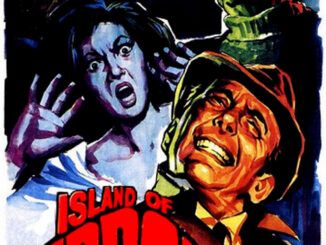
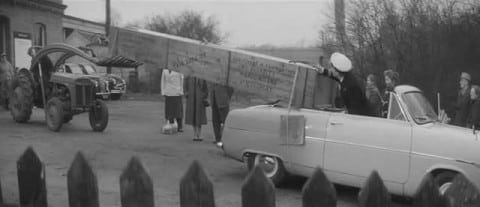

This film has an unsettling look and feel to it with some great (and not so great) performances and effects, and even by today’s standards I think it still is an excellent watch. I have always thought that final shot with the bells ringing signalled the success of the attempts to correct earth’s orbit, even though i’m a “glass half full” sort of person – guess deep down I may be an optimist after all!